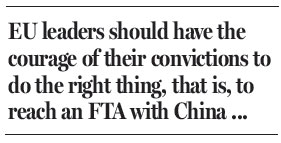After the European Union and its fifth-largest trading partner Vietnam announced last week that they had agreed in principle to lift most tariffs on goods in the coming years, China and the EU should seriously think about removing their customs barriers to boost the combined economies of roughly 2 billion consumers. On Aug 4, the EU said it would eliminate its duties over a seven-year period and Vietnam agreed to liberalize trade in financial services, telecommunications, transport, and postal and courier services over 10 years.
The agreement, the first comprehensive deal between the EU and a developing economy, according to Brussels, serves as a stepping stone to clinch similar deals between the EU and the Association of Southeast Asian Nations as a whole. The EU has already entered into a free trade agreement (FTA) with Singapore.
The fact that the EU and Vietnam have struck such a deal in less than three years should prompt China to reschedule its negotiation timetable on investment and trade with the EU. At present, Beijing and Brussels are engaged in stand-alone investment talks, and it is expected that the combined text offered by both sides can be formed by the end of this year.
But Brussels is not in a hurry to enter into an FTA with Beijing despite the latter's eagerness to do so. The demand of the global economy, however, seems different. Therefore, the two sides should ideally form separate teams to discuss an FTA. Or, they can consider working on the format of the ongoing talks between the EU and the US, that is, the Transatlantic Trade and Investment Partnership negotiations to combine investment and trade talks together.
The right occasion to announce a feasibility study on a Beijing-Brussels FTA would be the high-level China-EU economic and trade dialogue in Beijing next month. China has been urging the EU to do so but the subject is still limited to the common agenda of the two sides.
The stalemate over the Doha Development Round has triggered many a bilateral free trade agreement negotiation. The EU has already entered into such talks with some 50 partners across the world and even entered into an agreement with Vietnam. China, on the other hand, has signed 19 FTAs worldwide, with the developed economies such as Australia, Switzerland and Iceland on the list.
So, technically, there should not be mounting barrier between the EU and China to sit down to hold talks on trade agreements. What is needed is only political will.
China is determined to integrate deeper with the world economy and sees FTAs as a new channel to further open up to the outside world and expedite its market-oriented domestic reforms. It believes FTAs to be an important supplement to the multilateral trading system.
The EU knows the significance of FTAs and is aware of the fact that more than 90 percent of the world demand will be generated outside the EU in the coming years. As a result, it also knows that a key priority for the EU should be to try and open up more markets for European businesses through FTAs with key countries.
China is still generating increasing demands because it is in a critical stage of urbanization and industrialization, and EU should not ignore this fact.
While listing FTA talks with the US as one of the EU's 10 priorities, European Commission President Jean-Claude Juncker said last winter: It is anachronistic that Europeans and Americans still impose customs duties on each other's products; these should be eliminated, quickly and completely in the 21st century.
If other EU leaders share Juncker's views, they should use the same visionary approach when considering a strategic partnership with China.
EU leaders should have the courage of their convictions to do the right thing, that is, to reach an FTA with China, especially because the world is growing at its slowest pace in years and the trade volume between Beijing and Brussels is shrinking. This is the right time for Beijing and Brussels to take measures to remove customs barriers.
The author is China Daily chief correspondent in Brussels. [email protected]


(China Daily 08/11/2015 page9)
